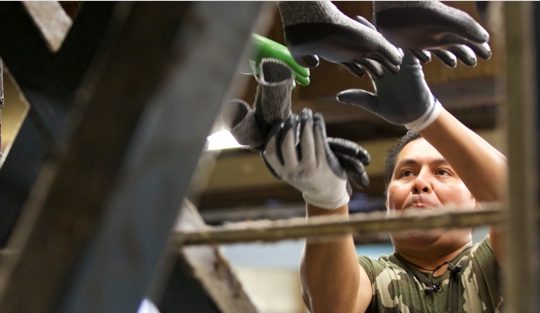- FIND GLOVES BY HAZARD
-
FIND GLOVES BY INDUSTRY
- Food
- Printing
- Engineering
- Automotive
- Chemical
- Railways
- Metallurgy
- Healthcare
- Packaging
- Mechanical
- Glass
- Electronics
- Utilities
- Construction
- Landscaping
- DIY
- Outdoor Sports
- Mining
- Airports & Ports
- Janitorial
- Manufacturing
- Warehousing & Distribution
- Clean Room
- Pharmaceutical
- Aerospace
- Laboratory
- Municipal services
- Agriculture
- Commercial Fishing
- Oil and Gas

At the start of 2022, COVID-19 cases were once again rising across the globe. Although businesses are more prepared with what to expect, these are still uncertain times for all industries. And, coupled with managing new risks that come with spiking infections, supply chains are still juggling the long-term effects of the pandemic from 2020-21.
The height of COVID-19 saw already-strained supply chains being met with unprecedented increased demand. The need for Personal Protective Equipment (PPE) grew dramatically, as front-line workers battled to reduce their risk of infection. One key example is the single-use glove, which saw an exponential rise in demand.
Although not to the same degree as 2020, the supply chain effects of COVID-19 are still felt in major manufacturing economies like Asia. And so, to combat supply issues and support the needs of U.S. citizens, we have upped its commitment to domestic manufacturing.
This focus on Made in America gloves will increase jobs, reduce manufacturing time, and guarantee product quality. Alongside these benefits, our carbon footprint will be greatly reduced by decreasing the reliance on commercial shipping.
The Carbon Footprint of Shipping and Aviation
Shipping
According to the International Maritime Organisation (IMO), shipping currently accounts for around 3% of total global carbon emissions. That comes as no surprise – as 90% of all traded goods are transported by container ships.
Currently, around 95% of protective gloves are made in Asia, compared to just 1% in the USA. The vast majority are produced in Malaysia, which accounts for roughly 60-65% of global production. After Malaysia, Thailand currently holds around 18%, and China manufactures 10%.
Manufacturing in Asia keeps production costs down, in turn reducing prices for our customers. However, it’s difficult to ignore the environmental impact of shipping PPE to the USA and EU.

To stay in line with the 2050 Paris climate agreement, the shipping industry has some serious changes to make. Yet, due to an increase of 10% in emissions between 2012 and 2018, the IMO predicts the industry’s emissions could be 30% higher than 2008 by 2050.
Commercial Aviation
Commercial aviation carries around 0.5% of the volume of world trade shipments. Between Asia and the USA alone, air transport amounted to 44 million metric tons of CO2 emissions in 2019.
Due to the higher cost and logistical challenges of air transport, it’s often only very high-value commodities, such as items that are perishable or time-sensitive, that are shipped by air.
Domestic Production
The impracticality of commercial aviation and the carbon footprint of the shipping industry has led SHOWA to take action. Increasing production in the USA was a logical next step when considering the time-pressured demand for PPE like single-use gloves.
However, a decision to extend production capabilities in the USA doesn’t come without its challenges. SHOWA had to line up commitments from customers before going ahead with the project. Alongside increased material and production costs, there are infrastructural challenges with domestic production that SHOWA had to combat.
How Infrastructure Plays a Crucial Part in Made in America Gloves
Occasionally, transitioning from overseas to domestic manufacturing can actually increase carbon emissions. A toilet paper company found that it was more carbon-efficient to make and ship their product to their seven Australian warehouses from China, than to produce and distribute it within the Australian road network. In fact, when comparing sea miles vs road miles, road emissions would have been 10x more intensive than sea freight.
Without a strong infrastructure, the emissions of a domestically produced product may be larger than shipping internationally and distributing from a range of nationwide ports. To keep road miles down, SHOWA utilizes a central within the US, enabling a reduction in road miles and the ability to meet the increasing demand for USA PPE in America and Europe.
When manufacturing in Malaysia and shipping to the United States, each glove travels 7880 nautical miles over 33 days on a shipping container, as well as a 15-hour truck journey from Los Angeles to its final destination in Denver. Producing Made in America SHOWA gloves cuts this journey down considerably. After production in Fayette, each glove travels just 1,300 miles over 18.5 hours before reaching Denver.
An Opportunity for Growth
Our newest factory in Fayette, Alabama can house 4 high-speed monorail production lines. Each one can produce around 48,000 units per hour versus the older lines’ hourly production rate of 12,000. As well as the reduced emissions, Fayette’s expansion allows us to gear up production capacity to 1.2 billion gloves per year, meeting front-line and all other domestic demand. The factory expansion will also create over 100 new jobs for USA workers. Similarly, there will be greater opportunity for our groundbreaking research and development.
Biodegradable Single-Use Gloves
The expansion of the existing Fayette site will also include an integrated biodegradable technology platform. The new platform increases the production capacity for our revolutionary Eco Best Technology® – biodegradable single-use gloves.
We will be able to produce Eco Best Technology® gloves at a rate that meets domestic needs with a focus on keeping frontline workers safe and healthy, as well as fighting against a myriad of everyday hazards and unpredictable disasters.
All of our domestic-made nitrile products will contain Eco Best Technology® in the compound. The technology helps maintain their commitment to earth-friendly manufacturing practices and further reduce their total carbon footprint.

#MadeinAmerica
With Fayette’s existing and future production, we will significantly reduce its carbon footprint within the USA and on a global scale.
Furthermore, the expansion solidifies our commitment to hiring USA workers to produce domestic-made products, retaining over 70 years of experience. And by distributing the products throughout the vast network of customers throughout North America, our scaled-up production meets the needs of America’s workforce, including those on the front line.
Overseas, our European customers benefit from a reduced dependency on Asia, where supply is strained by the pandemic’s supply chain issues, trade wars, and low production quality.



